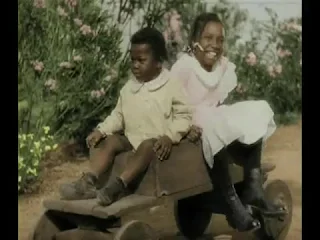Classic Reel : The Little Colonel
Cast: Shirley Temple, Lionel Barrymore, Evelyn Venable, John Lodge, Bill Robinson and Hattie McDaniel
Year of Release: 1935
Directed By David Butler
Plot: A charming little girl embarks on a mission to reunite her estranged grandfather with her parents, revealing the magic of forgiveness and family ties.
Shirley Temple was the most beloved leading child star during her acting career, bringing sunshine and joy to millions of fans. She was a natural-born actress who, since her debut at the tender age of 4, was known for her unique ability to memorise her lines and display both tomboyish and little girl cuteness at the same time. Temple sadly died at the age of 85 in 2014, but her legacy will forever live on.
The Little Colonel is one of the top movies she’s remembered for, co-starring with Lionel Barrymore. Evelyn Venable (who voiced the Blue Fairy in Disney's Pinocchio) and John Lodge played her parents, and future Oscar winner Hattie McDaniel played their housekeeper, Mom Beck.
Temple’s character is a child born to a Southern lady (her accent didn't exactly sound southern) who was disowned for choosing to marry a Northerner. The movie opens with her father (Barrymore) sending Elizabeth away from his house and out of his life when she refused to give up her Yankee fiancé, Jack. The setting was actually some years after the Civil War, but the old Colonel’s wounds apparently still ran deep. Years later, the family moves to a cottage near the big house. The Colonel goes there with flowers to welcome his new neighbours, but on seeing his daughter abruptly leaves. His first meeting with Lloyd is antagonistic, but later immediately warms to her after hearing her name, Lloyd Sherman-a combination of his last name and his son-in-law's. With her dad away prospecting for gold, the little colonel and the old Colonel begin spending time together.
Also in the movie was actor and dancer Bill Robinson, the highest-paid African American entertainer at the time. Nicknamed ‘Bojangles’, Robinson played Walker, the Colonel’s butler whom Lloyd befriends. There is a memorable scene when Robinson performed the famous ‘Staircase dance’, entertaining Lloyd and then doing the dance with her.
Being a very skilled tap dancer, Robinson actually taught Temple the dance routine; thus, the 57-year-old Robinson and the 6-year-old Temple became the first interracial onscreen dancing duo in Hollywood film history, appearing in 3 more movies together.
The movie was basically about how love can heal the hardest of hearts and the value of family, forgiveness and reconciliation. In this case, it was the love of a child. While the Colonel adamantly refused to have anything to do with the daughter he disowned and his Yankee son-in-law, he found himself drawn to his granddaughter, whose first name is his last name. That probably immediately told him his estranged daughter still had a lot of regard for him, but was too stubborn to admit it and accept her marriage. Temple’s portrayal of the precocious but adorable little girl was a pleasure to behold, her singing, dancing and mature delivery of her lines almost make you forget she was a mere child of 6 at the time, and have you laughing- especially the scenes where she stands up to the Colonel. Her bubbly nature was the opposite of her grumpy grandpa’s, who noticeably softened whenever she was with him.
Lionel Barrymore, being a member of the famous Barrymore theatre family, was the more experienced actor, but Temple clearly stole the show. He was able to give a great performance in spite of the fact that he wasn't in the best of health at the time and had trouble remembering his lines; his interactions with Temple were very sweet. There was a touching scene where she sang to him, and
The Colonel clearly visualised his daughter playing the harp. Evelyn Venable, who played Lloyd’s Mum, was added to the scene via a remarkable camera job, considering movie technology at the time wasn't as advanced as today’s.
Yet, we also see Lloyd’s vulnerable side when, while she likes being in her grandfather’s big house, she sobs in her room because she misses her parents; at the same time, she shows she values her parents more than any form of luxury her grandfather gives her. In the movie’s climax, she made that glaringly clear to him when she gave him an angry ultimatum, which in turn gave him an epiphany and led to the movie’s happy ending.
The movie was shot in black and white, but several years later was colourised, thanks to computer technology. There were some heartwarming scenes, which included Lloyd walking between Mom Beck and Walker, holding their hands, Lloyd at home with her parents, playing a game with Grandpa, Walker slipping the dog into Lloyd’s room to cheer her up, and she and Walker dancing to the tune of
‘Oh, Suzanna’ at the stables, her friends May Lily and Henry watching in delight.
Robinson himself faced criticism off-screen for his role, as it was regarded as stereotypical; he was called an 'Uncle Tom.'
Why, because of his role as a servant or his character’s friendship with Temple’s? Robinson and Temple not only had a very warm and close interaction in the movie (a rare thing in those days), but they were lifelong friends off-screen, considering it was the time of racial segregation. To her, he was Uncle Bill while she was Darlin’ to him. If anyone could dare try to shame him for being able to teach and perform with a lovely child like Shirley Temple and for his role of a tap-dancing butler (giving that really great roles for African Americans were limited back then), they simply enjoy being hateful and choosing not to pay attention to Robinson’s skills or understand how genuine affection goes beyond race.
Watch the movie, you’ll love it... especially the ‘Staircase’ dance!
















Comments
Post a Comment